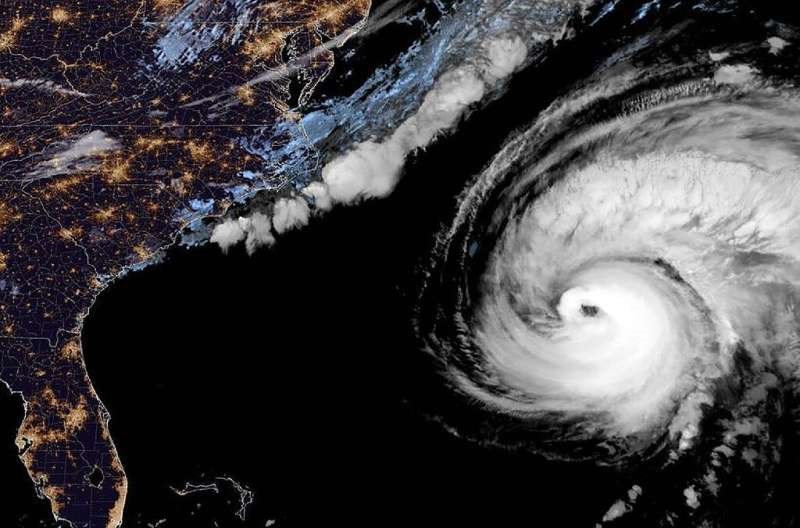Storm Fiona lashes into eastern Canada; houses washed into sea
Hurricane Fiona knocks out power to more than 500,000 residences.
-

Hurricane Fiona made landfall in eastern Canada's Nova Scotia on Saturday.
Hurricane Fiona slammed into eastern Canada on Saturday, knocking out electricity for thousands and washing homes into the sea as it pounded the area with "like nothing we've ever seen" winds and precipitation.
Two women were swept into the ocean near Newfoundland. One was saved, and the second case was being investigated, according to the Royal Canadian Mounted Police.
In a Facebook video posted Saturday night, Mayor Brian Button of Channel-Port aux Basques, on the southwestern corner of Newfoundland, said at least 20 homes had been destroyed and the village looked like a "complete warzone." "We've got destruction everywhere," he said.
Button said a boil-water order was in effect, and he encouraged residents in need to seek refuge at a nearby elementary school.
As of the late afternoon, approximately 500,000 homes in the region were without power as the storm pounded a vast area, downing countless trees and ripping roofs off structures.
"The power lines are down everywhere," Erica Fleck, assistant chief of Halifax Regional Fire and Emergency, told CBC. "It's not safe to be on the roads."
Despite being reduced to a post-tropical storm, Fiona still packed hurricane-force gusts of 80 miles (130 kilometers) per hour as it initially barreled into Canada after hammering the Caribbean.
According to the Canadian Hurricane Centre (CHC), the storm's highest sustained winds had decreased to 68 mph by late Saturday, with the government reporting isolated gusts of more than 100 mph in Newfoundland and Labrador, as well as Nova Scotia.
Nova Scotia hit hard
The storm made landfall in Nova Scotia province at about 3:00 a.m. (0600 GMT), according to the CHC.
By Saturday night, 294,000 households in the province were still without power, according to Nova Scotia Power, while repairs had begun on some lines, with the utility's president warning that outages might last for days.
More than 25,000 in New Brunswick were still without power while 82,000 customers were without electricity on Prince Edward Island.
"Trees have come down on homes, trees have come down on cars, there are buildings that have collapsed," Fire Chief Lloyd MacIntosh in the Nova Scotia town of North Sydney told CBC.
Police in Charlottetown, Prince Edward Island's capital, released photographs of downed power lines and roofs damaged by felled branches.
"It's incredible," said Charlottetown mayor Philip Brown on Radio-Canada TV. "It's stronger than Hurricane Juan in 2003."
Trudeau cancels trip
Canadian Prime Minister Justin Trudeau, who rescheduled his trip to Japan for former Prime Minister Shinzo Abe's funeral in order to visit the damaged areas, reminded Canadians that the "government is standing ready to support provinces with any necessary resources."
"We're thinking first and foremost of the people who've had a terrifying past 12 hours," Trudeau said during a press conference Saturday, adding that the country's military would aid in the recovery effort.
Canada had issued severe weather warnings for large areas of its eastern coast, asking residents to stock up on supplies for at least 72 hours.
The CHC reported rainfall of up to 7.5 inches (192 millimeters) in Nova Scotia, as well as waves of high to 40 feet (12 meters) in Nova Scotia and western Newfoundland.
Puerto Rico struggling
Fiona had passed through Bermuda the day before, with residents bracing for the worst and authorities urging people to stay inside as fierce winds raged across the British colony. As the hurricane passed around 100 miles west of the island, no fatalities or substantial damage were reported.
Fiona killed at least four people in Puerto Rico earlier this week, while two deaths were recorded in the Dominican Republic and one in the French overseas department of Guadeloupe, according to US media.
President Joe Biden proclaimed a state of emergency in Puerto Rico which is still reeling from the devastation of Hurricane Maria five years ago.
President Luis Abinader of the Dominican Republic declared three eastern provinces disaster zones.
As the Caribbean was on the course to recovery, Cuba, Jamaica, and Florida were bracing Saturday for the arrival of tropical storm Ian, which is expected to gain power in coming days to reach "at or near major hurricane strength," the NHC said.
Read next: Hurricane Fiona leaves Puerto Rico with electricity and water crises

 4 Min Read
4 Min Read










